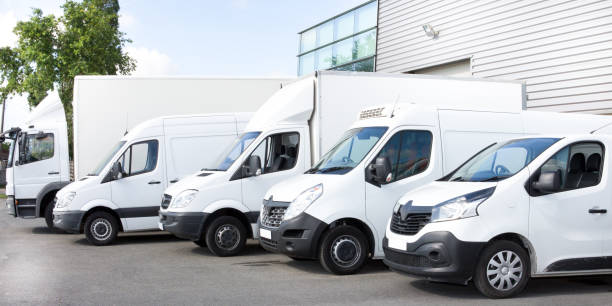It can be difficult to get the appropriate commercial vehicle insurance, particularly if you own a small business. You may want moderate or heavy truck insurance coverage, depending on the kind of vehicle you employ for business purposes and its use.
Business cars with a total gross weight of 3.5 metric tons or less that transport lighter commercial items are covered by light commercial vehicle insurance. Conversely, bigger business vehicles with a total weight above 3.5 tons are covered by heavy commercial vehicle car insurance.
Commercial Vehicle Insurance: What is it?
For organizations that utilize cars for business travel, commercial vehicle insurance is an essential policy. It provides coverage for a range of uses and circumstances not included in your standard personal vehicle insurance plans.
A commercial car policy provides greater liability limits and comprehensive insurance coverages to suitably safeguard your company assets according to elements like value, usage frequency, and other considerations. Your company’s assets might be comprised of nothing outside of all of its personnel and cars, so you want to protect those assets with the proper insurance coverage.
A commercial vehicle insurance coverage also shields your company from monetary damages brought about by potential litigation if you are found to be at fault for an accident.
When is commercial auto insurance necessary?
Getting commercial car insurance is mandated by law if you transport persons or products over state boundaries. Additionally, most states need commercial auto insurance coverage if you and your staff utilize cars for business-related or for-profit activities, such as:
- Supplying local customers with food and other goods
- Serving as a cab company
- Attending customer meetings and making sales calls
- Shifting shipments for a small business to a shipper, etc.
Additionally, if your automobile has a commercial license plate or is registered as a commercial vehicle, you need to get commercial auto insurance.
Which Vehicle Types Are Included in a Light Industrial Auto Insurance Policy?
Policies for business vehicle insurance often cover a large variety of commercial vehicles.
Service utility vehicles, box trucks, minivans, and compact pick-up trucks are all particularly covered by light business insurance. It includes coverage for standard autos as well as those utilized in a business capacity.
To make sure your insurance covers the intended use of your vehicle, you must obtain light business vehicle coverage if you own one.
What Is Covered by Commercial Auto Insurance?
Numerous coverage choices are available with commercial auto insurance. Typical coverages you could receive consist of:
Insurance Against Liability
Generally speaking, insurance companies provide two primary categories of liability coverage: damaged property (which covers harm to another person’s property) and physical injury (which covers harm to third persons).
Funeral costs and legal costs in the event of fatalities or litigation brought about by your negligence are also covered by this policy.
As a type of liability coverage called combination single limit (CSL) insurance, you can acquire property damage and bodily injury coverage jointly or individually.
Underinsured/Uninsured Driver
Coverage for uninsured drivers pay for any physical harm you or the passengers in your company-owned car that is the result of an uninsured driver’s collision. You are also covered in the event of a hit-and-run.
Underinsured motorist coverage is useful when the at-fault driver has auto insurance, but it is insufficient to pay for all losses.
Payments for medical care
If you or any of your passengers are hurt in a covered accident, medical payments coverage will cover those costs. Whether or not you are the one to blame is irrelevant.
Roadside support
In the event that your covered car breaks down while traveling, roadside assistance will pay for on-site repairs. For small company owners who are just starting out in the trucking sector, this kind of coverage is very important.
Hired auto liability insurance covers third parties harmed in an accident brought on by a car you’ve rented, borrowed, or hired for business purposes for both physical and property damage.
How Does Auto Insurance for Businesses Operate?
Personal and commercial auto insurance operate in a comparable manner. In the event that you or your workers at your small business cause an accident resulting in property damage or injuries, the parties impacted may file an action or claim to recover damages.
Up to the policy maximum, your insurance provider will pay the claim amount if you have the proper business vehicle coverage. If the claim is more than your insurance maximum, you will just have to pay the difference out of pocket.
Furthermore, your insurance provider pays for the costs of defending yourself and your staff in the case, frequently independent of the insurance limit.
Does Business Use Get Covered by Personal Auto Insurance?
Business use is typically not covered by personal vehicle plans. They only cover cars used for private transportation. To ensure your safety, you might need to obtain commercial auto insurance if you use your own vehicle for work-related purposes.
For business purposes, some single owners might find that their personal motor insurance is adequate. With no commercial auto insurance, they may prosper. However, a lot relies on the particular circumstances.
It’s advisable to always verify with your insurance company whether your small business qualifies for this category prior to acquiring coverage.
How Can I Get Insurance for Commercial Vehicles?
In order to obtain affordable commercial car insurance, evaluate your present and future company requirements. Compare quotes from the best commercial vehicle insurance in your state and choose the one that best suits your company’s objectives.
Think about things like the reputation of the insurer, the features that let you customize your policy (such as rates, deductibles, and coverage limitations for companies similar to yours), how claims are handled, the caliber of customer service, and any discounts or resources that are available.
Select an insurance provider that offers customized coverage and guarantees adherence to both federal and state regulations for business vehicle insurance.
For a more efficient approach, think about working with a licensed independent insurance agent; they are able to assist you with the claims procedure and promptly determine which type of coverage is ideal for your small business.
In Conclusion
Recall that purchasing the appropriate commercial vehicle insurance is an investment in your small company. It reduces unforeseen company expenses so that you may maintain financial stability and a consistent cash flow must grow your company’s activities.
Sufficient commercial auto insurance also provides the highest level of defense against unforeseen circumstances, enabling you to recover from setbacks more quickly. Knowing that you are safeguarding your company for the long run, take your time in your study to identify the top insurance provider.



